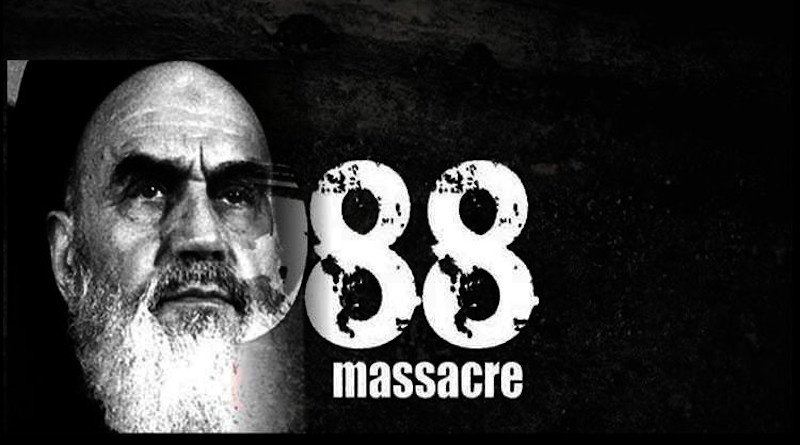Iranian Officials Increasingly Worried About Facing Justice For 1988 Massacre – OpEd
By Matin Karim
At a recent book fair for the Iranian regime’s repressive Basij force, Mohammad Mehdi Dezfuli, a regime-affiliated researcher and documentary filmmaker, said, “What is clear today in the history of the Islamic Revolution, unfortunately, not much attention has been paid to the first decade of the revolution. Therefore, it is felt that many of the events that we are suffering today, including doubts about big issues, go back to the early decade of the Islamic Revolution.”
Dezfuli referred to the 1980s, in which the Iranian regime brutally murdered, tortured, and executed tens of thousands of dissidents. One particular event stands out: In the summer of 1988, the regime executed more than 30,000 political prisoners, mostly members and supporters of the People’s Mojahedin Organization of Iran (PMOI/MEK). The executions were carried out under the direct order of regime founder and then-supreme leader Ruhollah Khomeini.
The grim event, which has become known as the 1988 massacre, has garnered growing attention in recent years. Last year, a court in Sweden sentenced a former Iranian prison guard to 20 years in prison for his role in the 1988 massacre. Jurists and human rights lawyers from across the world have gathered and documented evidence about the 1988 massacre and are calling for the prosecution of the highest authorities within the regime, including president Ebrahim Raisi and supreme leader Ali Khamenei. The 1988 massacre and the need to bring its perpetrators to justice was the focus of a full conference at the Free Iran 2023 World Summit.
In his remarks, Dezfuli also said, “The message that [Khomeini] sent about the Mojahedin after Mersad [Operation Eternal Light], my take about this message is that if the founder of the Islamic Revolution did not send that message about the Mojahedin at the time, they would have to answer to history.”
He added: “This issue has now been debated for nearly 35 years as to why the number of executions has been such… If history is not narrated correctly, because there are issues that you cannot say—we had a group that tried to strike at Iran at the most sensitive juncture and some of them were tried and issued a ruling on whether or not they stand by their position [to support the PMOI]. Those who stood firm were executed. I think this is one of the important points in the history of the Islamic Revolution and Imam Khomeini issued the message at the right time.”
Dezfuli’s remarks are just a reflection of the intensifying dilemma of the regime. The growing activity about the 1988 massacre, which was initiated by Justice Movement launched by the Iranian Resistance, has caused growing consternation among regime officials. Some have tried to distance themselves from this crime against humanity by downplaying their role and laying blame on others.
Meanwhile, the momentum gathers for the prosecution of these criminals. And the growing wave of protests inside Iran and the role played by the MEK Resistance Units, has caused worries among regime officials that the day of accountability is approaching.
Some regime officials are expressing concern that not only did the regime fail in annihilating the PMOI, but it has failed in preventing youth from joining their ranks.
This is why figures and so-called experts such as Dezfuli are trying in vain to cast a different light on the 1988 massacre to lift the dwindling spirits of the regime’s troops.
But the regime can’t stop the wave caused by the sacrifices made by the martyrs of the 1988 massacre. Today, justice for the victims of the 1988 massacre has become a rallying cry for many Iranians inside the country and across the globe. This solidarity was put on full display after the regime’s judiciary recently issued a warrant for the prosecution of 104 PMOI members.
Not only did the warrant intimidate the supporters of the PMOI—the effect that the regime had wished for—but it had the reverse effect of shedding light on the regime’s own crimes. In response, relatives of the victims of the 1988 massacre across the world expressed their full readiness to take part in a court and present evidence of the regime’s crimes in executing their relatives.
It has long dawned on Iranian officials that their regime is on borrowed time, and sooner or later, they will have to face justice.
Ali Zu’algham, another regime expert who spoke at the book fair, said, “I think the messages of [Khomeini] in the final year of his life respond to a serious need for us in the future, what we have witnessed in the last year in the form of criticism, attack and slander against the Supreme Leader has launched a trend that of course is not the only address to [Khamenei] but also [Khomeini].”
This article was published by PMOI/MEK

